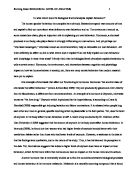Another hormone that is extensively studied as to find the connections between biological processes and human behaviour is the hormone melatonin. Melatonin is a naturally occurring compound that is found in many species on our Earth. The production of this hormone occurs with perceived darkness and yet is inhibited by the presence of light (Crane & Hannibal, 2009), and is most commonly associated with helping to regulate sleep cycles (Beck, 2010). Yet, according to researchers of hormones, it also has mixed properties; among some species increased levels of melatonin caused reduced aggression, while in others it increased aggression. An experiment done by A.D. Munro, a researcher in 1986 showed that injections of melatonin in a cichlid fish caused “reduced aggressive response.” (Munro, 1986) However, another study disputed that evidence; hamsters that were given melatonin showed increased aggression the next day, according to researcher Jasnow, et al. (2002) Of course, the main weakness of these two studies were that they were not conducted on humans and were instead conducted on animals, which results may not necessarily match results of a human. Therefore, a study conducted in 1984 by the Department of Psychology at Massachusetts Institute of Technology did research on human beings and their relation to melatonin. The study was conducted by researchers giving volunteers either an oral pill with melatonin, or a placebo. The results showed that an injection of melatonin to the volunteers caused them to act in a rather withdrawn and sedated manner. Their reaction to different tests and overall character showed the researchers and that indeed an injection of melatonin caused the subjects to overall “slow down” and feel rather exhausted. The results in all three studies suggest that indeed melatonin does have an impact on behaviour. Overall, hormones at the biological level do seem to have an impact on human behaviour, yet hormones still cannot explain many other intricacies of behaviour; there is always a limit to what suggested data can show.
The environment; our world around us also affects our behaviour in profound ways. A researcher named Maguire attempted to demonstrate the plasticity of the brain by a study conducted on London “Black Cab” taxi drivers. Her hypothesis was that they would have bigger posterior hippocampi than control subjects. (as cited in Milner, 1999). The reason she thought so was because the role of the “hippocampus was to facilitate spatial memory in the form of navigation.” (Milner, 1999) The research was done by machinery such as Voxel-based morphometry that would examine an MRI scan for the hippocampus size of the control subjects and the taxi drivers. The results showed that indeed the hippocampus size of the taxi drivers were larger than the control subjects; hippocampus size in general. This matches with the idea that their hippocampus size should be bigger due to the vast amount of knowledge they must possess for the taxi driver exam. In general, the data here suggests that indeed our environment does affect our brain processes and hence our behaviour.
Another factor from the environment is our interactions with other people, consciously and unconsciously as well. A study done by Iacoboni (as cited in Crane & Hannibal, 2009) produced data suggesting that indeed our behaviour is impacted by the feelings and in general, the environment around us. His study involved subjects imitating the face on the screen and then merely looking at the screen the second time around, all while undergoing an MRI (Crane & Hannibal, 2009). His results were that indeed the mirror neurons were passed around when seeing the other person’s reaction and empathizing with it. For example, when the person in the picture smiled, the person’s brain would activate pleasure centres as well (Crane & Hannibal, 2009). Perhaps in a modern perspective that would be the reason why people like to observe and see other people smiling, according to another study Krumhuber, Manstead, & Kabbas (2007) which data closely matches the previous study. Hence, both of the studies on taxi drivers and the study on facial expressions suggests that indeed the environment is another factor to explaining our behaviour. However, there is also a limit here to what studies can show; it should also be mentioned that there were other studies done by researchers that have shown that people’s brain have shown their displeasure at other people smiling in a certain context, thus conflicting with the above study conducted by Iacoboni (Kanazawa, Russell-Karazin, 2011).
Neurotransmitters play perhaps arguably the biggest role in explaining human behaviour. Neurotransmitters are “the body’s natural chemical messengers which transmit information from one neuron to another.” (Crane & Hannibal, 2009) They are vital for passing messages for influencing human behaviour, such as “mood, memory, sexual arousal, and [up to even] mental illness.” (Crane & Hannibal, 2009) One neurotransmitter that is a major example of induced behaviour is the Serotonin. Two researchers at Tokyo University, Kasamatsu and Hirai, decided to examine how sensory deprivation affects the brain (as cited in Crane & Hannibal, 2009). Their test subjects were Buddhist monks on a pilgrimage who were depriving themselves of important items such as food and water. Kasamatsu and Hirai found out that when the monks were experiencing hallucinations and “ancient ancestors by their side” that they had an increased amount of serotonin (as cited in Crane & Hannibal, 2009). They concluded that the deprivation they experienced triggered the release of serotonin, which was the reason for their hallucinations and their perception of the world (Kasamatsu & Hirai, 1999). This data suggests that indeed neurotransmitters do play a certain role in behavioral aspect of humans.
Another neurotransmitter that allegedly explains human behaviour is dopamine. It is unique in the aspect that it also falls in the category of a hormone, yet for the purposes of this essay and that fact that common perception views it as a neurotransmitter this essay will discuss it as a neurotransmitter. Dopamine is mainly responsible for “voluntary movement, [decision making], learning, and feelings of pleasure.” (Crane & Hannibal, 2009) A researcher named Dr. Chudler at Washington University tested and found out that dopamine was a main factor in certain psychiatric disorders such as schizophrenia. (as cited in Cloe, 2011) He found that high levels of dopamine caused floods of impulses and thoughts to flow in the mind, which caused delusions to occur in patients. Hence, researcher Cloe points out that drugs that are used to treat schizophrenia and such disorders in the same category work “by lowering dopamine levels in the brain or by blocking dopamine’s effects.” (Cloe, 2011) Another area where dopamine works is the pleasure “centres” of the body. As an extreme example of how dopamine explain behaviour, Olds and Milner’s study in 1956 showed that rats were literally “addicted” to dopamine to the extent that they valued it over water and other basic needs and as a result died. (as cited in Bozarth, 1994) Both examples of neurotransmitters again show that indeed to a certain degree neurotransmitters can explain human behaviour. Yet, again there is an extent and limit to how much neurotransmitters can explain. Oversimplification of seemingly complex human behaviours to a simple solution such as serotonin without being fully proved remains a problem.
Human behaviour is an extremely difficult area of research. Even with today’s technology, researchers are still not able to solve the intricacies of the how we make our own actions. Yet, we can explain many happenings in the mind with external and internal factors, like the surrounding environment, hormones, and neurotransmitters. The overarching problem remains as to what extent can they really explain our mind? In fact, some researchers say, can they really explain anything? Or perhaps the answer is very simple; the happenings in the mind do occur as a result of those factors. Maybe the factors do somewhat explain the answer holistically, but yet we have yet to delve into the tiny intricate details of the mind. Or perhaps...we will never do find out what really is the right answer to our own actions and thoughts.
References
Beck, E. (2010, September 28). Retrieved from http://www.livestrong.com/article/245712-uses-of-melatonin-for-aggressive-behavior/
Cloe, A. (2011, May 4). Retrieved from http://www.livestrong.com/article/78835-dopamine-neurotransmitters-affect-behavior/
Crane, J., & Hannibal, J. (2009). Psychology, course companion. Oxford: Oxford University Press, USA.
Dean, J. (2007, May 2). Retrieved from http://www.spring.org.uk/2007/05/slow-smile-attracts.php
DeAngelis, T. (2008, February). Science watch. Retrieved from http://www.apa.org/monitor/feb08/oxytocin.aspx
Lieberman, H., Waldhauser, F., Garfield, G., Lynch, H., & Wurtman, R. (1984). Retrieved from http://web.mit.edu/dick/www/pdf/598.pdf
Lyubansky, M. (2011, May 30). Retrieved from http://www.psychologytoday.com/blog/between-the-lines/201105/study-finds-smiling-men-are-less-attractive-women
Milner, B. (1999, November 10). Navigation-related structural change in the hippocampi of taxi drivers. Retrieved from http://www.pnas.org/content/97/8/4398.full







